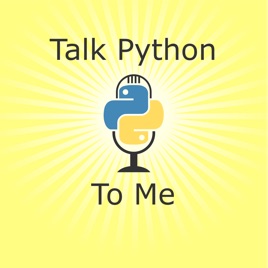
Advertise on podcast: The TWIML AI Podcast (formerly This Week in Machine Learning & Artificial Intelligence)
Rating
4.7 from
Country
This podcast has
690 episodes
Language
Publisher
Explicit
No
Date created
2016/05/21
Average duration
48 min.
Release period
6 days
Description
Machine learning and artificial intelligence are dramatically changing the way businesses operate and people live. The TWIML AI Podcast brings the top minds and ideas from the world of ML and AI to a broad and influential community of ML/AI researchers, data scientists, engineers and tech-savvy business and IT leaders. Hosted by Sam Charrington, a sought after industry analyst, speaker, commentator and thought leader. Technologies covered include machine learning, artificial intelligence, deep learning, natural language processing, neural networks, analytics, computer science, data science and more.
Social media
Check The TWIML AI Podcast (formerly This Week in Machine Learning & Artificial Intelligence) social media presence
Podcast episodes
Check latest episodes from The TWIML AI Podcast (formerly This Week in Machine Learning & Artificial Intelligence) podcast
Reasoning Over Complex Documents with DocLLM with Armineh Nourbakhsh
2024/02/19
Today we're joined by Armineh Nourbakhsh of JP Morgan AI Research to discuss the development and capabilities of DocLLM, a layout-aware large language model for multimodal document understanding. Armineh provides a historical overview of the challenges of document AI and an introduction to the DocLLM model. Armineh explains how this model, distinct from both traditional LLMs and document AI models, incorporates both textual semantics and spatial layout in processing enterprise documents like reports and complex contracts. We dig into her team’s approach to training DocLLM, their choice of a generative model as opposed to an encoder-based approach, the datasets they used to build the model, their approach to incorporating layout information, and the various ways they evaluated the model’s performance.
The complete show notes for this episode can be found at twimlai.com/go/672.
more
Are Emergent Behaviors in LLMs an Illusion? with Sanmi Koyejo
2024/02/12
Today we’re joined by Sanmi Koyejo, assistant professor at Stanford University, to continue our NeurIPS 2024 series. In our conversation, Sanmi discusses his two recent award-winning papers. First, we dive into his paper, “Are Emergent Abilities of Large Language Models a Mirage?”. We discuss the different ways LLMs are evaluated and the excitement surrounding their“emergent abilities” such as the ability to perform arithmetic Sanmi describes how evaluating model performance using nonlinear metrics can lead to the illusion that the model is rapidly gaining new capabilities, whereas linear metrics show smooth improvement as expected, casting doubt on the significance of emergence. We continue on to his next paper, “DecodingTrust: A Comprehensive Assessment of Trustworthiness in GPT Models,” discussing the methodology it describes for evaluating concerns such as the toxicity, privacy, fairness, and robustness of LLMs.
The complete show notes for this episode can be found at twimlai.com/go/671.
more
AI Trends 2024: Reinforcement Learning in the Age of LLMs with Kamyar Azizzadenesheli
2024/02/05
Today we’re joined by Kamyar Azizzadenesheli, a staff researcher at Nvidia, to continue our AI Trends 2024 series. In our conversation, Kamyar updates us on the latest developments in reinforcement learning (RL), and how the RL community is taking advantage of the abstract reasoning abilities of large language models (LLMs). Kamyar shares his insights on how LLMs are pushing RL performance forward in a variety of applications, such as ALOHA, a robot that can learn to fold clothes, and Voyager, an RL agent that uses GPT-4 to outperform prior systems at playing Minecraft. We also explore the progress being made in assessing and addressing the risks of RL-based decision-making in domains such as finance, healthcare, and agriculture. Finally, we discuss the future of deep reinforcement learning, Kamyar’s top predictions for the field, and how greater compute capabilities will be critical in achieving general intelligence.
The complete show notes for this episode can be found at twimlai.com/go/670.
more
Building and Deploying Real-World RAG Applications with Ram Sriharsha
2024/01/29
Today we’re joined by Ram Sriharsha, VP of engineering at Pinecone. In our conversation, we dive into the topic of vector databases and retrieval augmented generation (RAG). We explore the trade-offs between relying solely on LLMs for retrieval tasks versus combining retrieval in vector databases and LLMs, the advantages and complexities of RAG with vector databases, the key considerations for building and deploying real-world RAG-based applications, and an in-depth look at Pinecone's new serverless offering. Currently in public preview, Pinecone Serverless is a vector database that enables on-demand data loading, flexible scaling, and cost-effective query processing. Ram discusses how the serverless paradigm impacts the vector database’s core architecture, key features, and other considerations. Lastly, Ram shares his perspective on the future of vector databases in helping enterprises deliver RAG systems.
The complete show notes for this episode can be found at twimlai.com/go/669.
more
Nightshade: Data Poisoning to Fight Generative AI with Ben Zhao
2024/01/22
Today we’re joined by Ben Zhao, a Neubauer professor of computer science at the University of Chicago. In our conversation, we explore his research at the intersection of security and generative AI. We focus on Ben’s recent Fawkes, Glaze, and Nightshade projects, which use “poisoning” approaches to provide users with security and protection against AI encroachments. The first tool we discuss, Fawkes, imperceptibly “cloaks” images in such a way that models perceive them as highly distorted, effectively shielding individuals from recognition by facial recognition models. We then dig into Glaze, a tool that employs machine learning algorithms to compute subtle alterations that are indiscernible to human eyes but adept at tricking the models into perceiving a significant shift in art style, giving artists a unique defense against style mimicry. Lastly, we cover Nightshade, a strategic defense tool for artists akin to a 'poison pill' which allows artists to apply imperceptible changes to their images that effectively “breaks” generative AI models that are trained on them.
The complete show notes for this episode can be found at twimlai.com/go/668.
more
Learning Transformer Programs with Dan Friedman
2024/01/15
Today, we continue our NeurIPS series with Dan Friedman, a PhD student in the Princeton NLP group. In our conversation, we explore his research on mechanistic interpretability for transformer models, specifically his paper, Learning Transformer Programs. The LTP paper proposes modifications to the transformer architecture which allow transformer models to be easily converted into human-readable programs, making them inherently interpretable. In our conversation, we compare the approach proposed by this research with prior approaches to understanding the models and their shortcomings. We also dig into the approach’s function and scale limitations and constraints.
The complete show notes for this episode can be found at twimlai.com/go/667.
more
AI Trends 2024: Machine Learning & Deep Learning with Thomas Dietterich
2024/01/08
Today we continue our AI Trends 2024 series with a conversation with Thomas Dietterich, distinguished professor emeritus at Oregon State University. As you might expect, Large Language Models figured prominently in our conversation, and we covered a vast array of papers and use cases exploring current research into topics such as monolithic vs. modular architectures, hallucinations, the application of uncertainty quantification (UQ), and using RAG as a sort of memory module for LLMs. Lastly, don’t miss Tom’s predictions on what he foresees happening this year as well as his words of encouragement for those new to the field.
The complete show notes for this episode can be found at twimlai.com/go/666.
more
AI Trends 2024: Computer Vision with Naila Murray
2024/01/02
Today we kick off our AI Trends 2024 series with a conversation with Naila Murray, director of AI research at Meta. In our conversation with Naila, we dig into the latest trends and developments in the realm of computer vision. We explore advancements in the areas of controllable generation, visual programming, 3D Gaussian splatting, and multimodal models, specifically vision plus LLMs. We discuss tools and open source projects, including Segment Anything–a tool for versatile zero-shot image segmentation using simple text prompts clicks, and bounding boxes; ControlNet–which adds conditional control to stable diffusion models; and DINOv2–a visual encoding model enabling object recognition, segmentation, and depth estimation, even in data-scarce scenarios. Finally, Naila shares her view on the most exciting opportunities in the field, as well as her predictions for upcoming years.
The complete show notes for this episode can be found at twimlai.com/go/665.
more
Are Vector DBs the Future Data Platform for AI? with Ed Anuff
2023/12/28
Today we’re joined by Ed Anuff, chief product officer at DataStax. In our conversation, we discuss Ed’s insights on RAG, vector databases, embedding models, and more. We dig into the underpinnings of modern vector databases (like HNSW and DiskANN) that allow them to efficiently handle massive and unstructured data sets, and discuss how they help users serve up relevant results for RAG, AI assistants, and other use cases. We also discuss embedding models and their role in vector comparisons and database retrieval as well as the potential for GPU usage to enhance vector database performance.
The complete show notes for this episode can be found at twimlai.com/go/664.
more
Quantizing Transformers by Helping Attention Heads Do Nothing with Markus Nagel
2023/12/26
Today we’re joined by Markus Nagel, research scientist at Qualcomm AI Research, who helps us kick off our coverage of NeurIPS 2023. In our conversation with Markus, we cover his accepted papers at the conference, along with other work presented by Qualcomm AI Research scientists. Markus’ first paper, Quantizable Transformers: Removing Outliers by Helping Attention Heads Do Nothing, focuses on tackling activation quantization issues introduced by the attention mechanism and how to solve them. We also discuss Pruning vs Quantization: Which is Better?, which focuses on comparing the effectiveness of these two methods in achieving model weight compression. Additional papers discussed focus on topics like using scalarization in multitask and multidomain learning to improve training and inference, using diffusion models for a sequence of state models and actions, applying geometric algebra with equivariance to transformers, and applying a deductive verification of chain of thought reasoning performed by LLMs.
The complete show notes for this episode can be found at twimlai.com/go/663.
more
Responsible AI in the Generative Era with Michael Kearns
2023/12/22
Today we’re joined by Michael Kearns, professor in the Department of Computer and Information Science at the University of Pennsylvania and an Amazon scholar. In our conversation with Michael, we discuss the new challenges to responsible AI brought about by the generative AI era. We explore Michael’s learnings and insights from the intersection of his real-world experience at AWS and his work in academia. We cover a diverse range of topics under this banner, including service card metrics, privacy, hallucinations, RLHF, and LLM evaluation benchmarks. We also touch on Clean Rooms ML, a secured environment that balances accessibility to private datasets through differential privacy techniques, offering a new approach for secure data handling in machine learning.
The complete show notes for this episode can be found at twimlai.com/go/662.
more
Edutainment for AI and AWS PartyRock with Mike Miller
2023/12/18
Today we’re joined by Mike Miller, director of product at AWS responsible for the company’s “edutainment” products. In our conversation with Mike, we explore AWS PartyRock, a no-code generative AI app builder that allows users to easily create fun and shareable AI applications by selecting a model, chaining prompts together, and linking different text, image, and chatbot widgets together. Additionally, we discuss some of the previous tools Mike’s team has delivered at the intersection of developer education and entertainment, including DeepLens, a computer vision hardware device, DeepRacer, a programmable vehicle that uses reinforcement learning to navigate a track, and lastly, DeepComposer, a generative AI model that transforms musical inputs and creates accompanying compositions.
The complete show notes for this episode can be found at twimlai.com/go/661.
more
Podcast reviews
Read The TWIML AI Podcast (formerly This Week in Machine Learning & Artificial Intelligence) podcast reviews
Ashish US
2024/01/07
The best aiml podcast
I am following this podcast since 2017, my AI learning direction comes this podcast. Thankyou Sam !
mfnyai14
2023/11/10
Best pod for ai/ml practioners
Consistently great content - this is the podcast that actual ai/ml practitioners
atxfitgal
2023/05/20
Clear and educational
I’m a total noob to these topics but an otherwise smart person, and this podcast strikes a perfect balance between technical and accessible. Looking ...
more
fitelson
2021/12/23
A premier podcast on AI/ML
I have enjoyed listening to many of the episodes and had fun participating in one
steve5688547
2022/01/08
Lots of potential but incompetent host
The guests are amazing and this could be such an amazing podcast for the ML community. Unfortunately, the host is both a poor conversationalist (inter...
more
rohitand
2020/11/30
excellent machine learning perspective
Sam puts lot of attention to every episode. Information is high quality and easy to grasp.
belsayc
2020/11/24
Great interviewer
Sam's questions are so spot on. "That's an interesting question" is something you will hear guests say a lot.
meredithhu
2020/11/29
Many better AI podcasts out there hosted by scientists doing the dirty work
Difficult to listen unless the guest really knows what he or she’s doing and doesn’t mind the host.
J. Barshop
2020/09/02
Excellence with humility
TWIML AI has quickly become one of my go-to podcast - I appreciate the variety of episodes, the super practical takeaways and sincerity that Sam pours...
more
Laughlin321
2020/07/22
“You know”
Some good content, but hard to listen to. Please say “you know” less.
Podcast sponsorship advertising
Start advertising on The TWIML AI Podcast (formerly This Week in Machine Learning & Artificial Intelligence) & sponsor relevant audience podcasts
You may also like these technology Podcasts

5
1
114
Geladen - der Batteriepodcast
Daniel Messling, Patrick von Rosen

4.8
196
111
User Defenders – UX Design & Personal Growth
Jason Ogle

4.4
148
789
The AI in Business Podcast
Daniel Faggella

4.8
691
287
The Blogging Millionaire
The Blogging Millionaire Media Network

5
90
188
CFO Weekly
Personiv

4.6
966
502
Official PlayStation Podcast
PlayStation

4.8
563
449
Talk Python To Me
Michael Kennedy (@mkennedy)

4.6
149
1748
Daily Tech Headlines
Tom Merritt

4.9
423
374
Simple Pin Podcast: Simple ways to boost your business using Pinterest
Kate Ahl

4.7
41
146
The Josh Bersin Company
Josh Bersin



